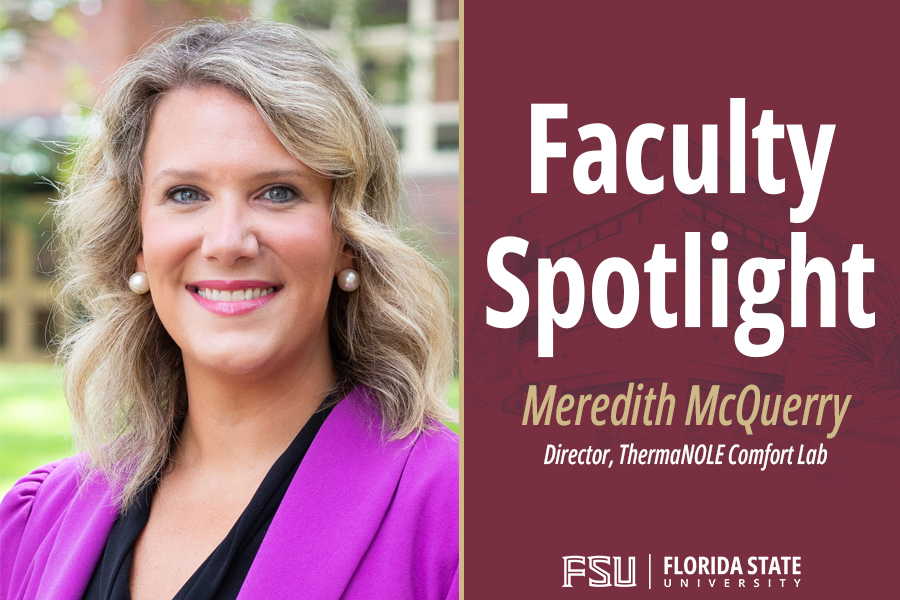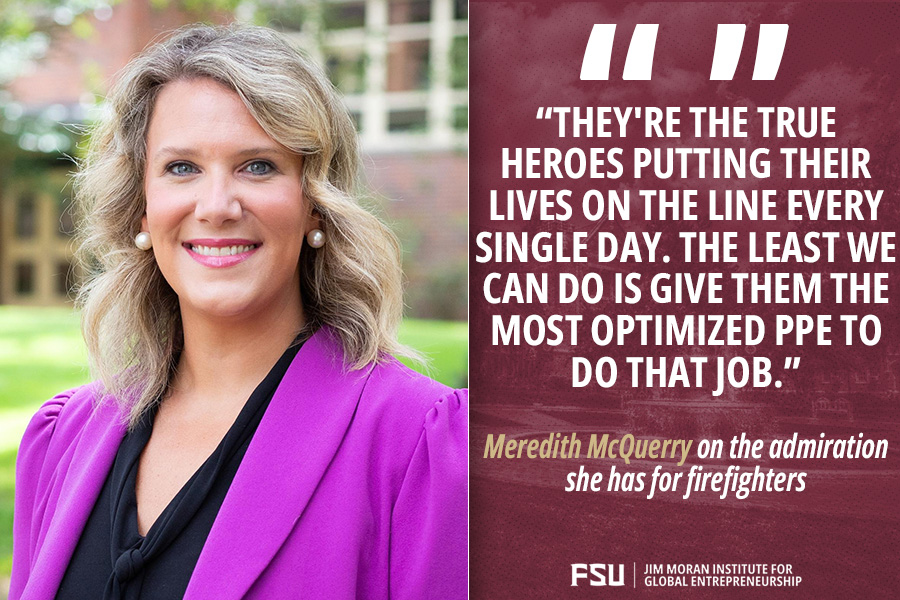
As wildfires continue to grow in frequency and intensity, there is an urgent need for firefighters to stay better protected against their damaging effects.
Florida State University ThermaNOLE Comfort Lab® Director Meredith McQuerry is providing groundbreaking research and innovative design that is making a difference in the firefighting community. She is aggressively tackling personal protective equipment (PPE) issues that many firefighters deal with, ranging from improper fit, reduced mobility, low durability, chafing and overheating.
In her latest analysis, she chaired a research team that concluded a 5-year multi-state project titled “Protective Clothing for Wildland Firefighters.” The project provided recommendations to the National Fire Protection Agency (NFPA) on improving methods for cleaning and safeguarding PPE for wildland firefighters.
McQuerry noticed there needed to be a difference between the cleaning standards of structural firefighters that battle fires in homes and buildings versus wildland firefighters who combat flames in natural areas.
“The issue was the standard (for wildland) was very much a carbon copy of structural firefighters, and they’re both very different in garments, the type of firefighting and exposure,” McQuerry said. “That led us to tackling this real-life industry research problem of how our wildland firefighters were using their gear, issuing their gear, storing their gear and cleaning their gear.”
Wildland firefighters can be deployed for up to 21 days in the wilderness, and while the laundering of their gear can be an afterthought, it is highly important. A survey performed by McQuerry and her research team showed that 98% of wildland firefighters were washing their gear at home, potentially exposing their own households to harmful substances.

“We want to figure out how they are doing things, what are the resources they have available to them and how can we bring those two together to move the needle forward,” she said. “This enables a huge opportunity for education so they’re getting (their gear) out of the home laundry and not increasing the risk of exposure to their family members.”
McQuerry knows it’s a delicate balance of finding solutions in her research with the realities that firefighters must deal with. Cleaning equipment after every exposure is ideal, but can be difficult for wildland firefighters if washing stations are inaccessible. The dilemma reinforces the importance of the standards she is developing to safeguard firefighters.
“It’s a challenge because their main goal is to fight fires, and as a PPE researcher, our goal is to protect them while they do that,” she added. “Not just to protect them from the acute hazards like radiant exposure from flames and carbon monoxide exposure, but from those longitudinal long-term hazards like carcinogens in cancer.”
Much of her work is dedicated to addressing the issues that have plagued firefighters for several years, including elevated cancer rates and heat stress. Her goals are to improve their safety with functional design and the development of market-ready prototypes.
Housed inside the Jim Moran College of Entrepreneurship, McQuerry’s ThermaNOLE Comfort Lab® is home to the world’s first dynamic sweating thermal manikin at a public institution, nicknamed ANDI (Advanced Newton Dynamic Instrument). It senses both heat loss and heat gain through clothing. ANDI sweats, walks and replicates human physiological responses in real time, including breathing rate, internal body temperature, sweating rate, skin temperature, skin blood flow and overall comfortability.
Helping make FSU an industry leader in PPE research, McQuerry has the tools in her textiles lab to provide her students with the best hands-on experience possible. With their help in running, collecting and analyzing different types of data, she credits her students with contributing to critical research that is needed for further advancements in PPE.
“Those students are operating a highly specialized, niche area of equipment that propels them to go onto careers in the industry and the military,” she said. “They’re continuing that research, which is really meaningful to me. We’re building a foundation to not just better the projects and the end users that we focus on here. They’re going out to better the world also.”
“We’re building a foundation to not just better the projects and the end users that we focus on here. They’re going out to better the world also.”
– Meredith McQuerry on the impact of her students
Her work has been influential across the globe, sharing her findings recently at U.N. headquarters in New York City that brought together fire chiefs, administrators and researchers from the United States, Europe and Australia.
Some of her latest studies are designed to better equip female firefighters, who regularly wear PPE that is ill-fitting. In 2023, she was part of a research team that published an article about their increased risk of occupational exposure because of improper fit.
“If we think about how females in the fire service are outfitted for their gear, it’s a little bit different than males,” McQuerry said. “It’s different for structural versus wildland. We published work showing females in the fire service are significantly different in terms of body measurements than the general female population. If we’re designing for them based upon the general population and trying to fit female firefighters, we’re going to miss the mark every time. That’s similar to research that’s been found in the military as well.”
McQuerry’s data analysis in assisting female firefighters is already making progress. Working with the NFPA, she helped create new PPE standards that include a sizing system for females – offering wildland firefighter shirts best catered to a female fit for the first time ever.
The passion that drives McQuerry does not come from a natural connection to firefighters. She attended college wanting to become a teacher but needed just one textiles class to realize she had a love for science. A professor who served as her mentor – a relationship that continues today – offered her an opportunity to work in a textiles lab, which led to her impactful research over the past 15 years.
As her journey continues and more advancements are made, McQuerry will always hold one thing constant: The admiration she has for firefighters and the intense work they do.
“They’re the true heroes putting their lives on the line every single day,” she said. “The least we can do is give them the most optimized PPE to do that job.”



